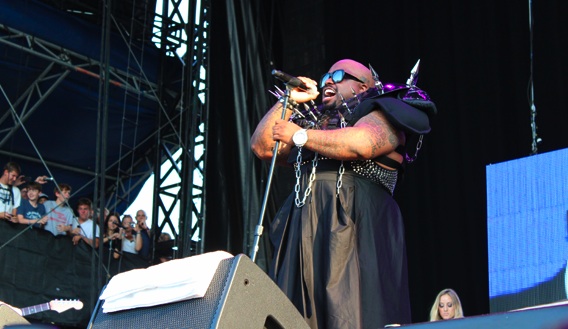Videos by American Songwriter
photos by Joshua Black Wilkins
Louisville, Kentucky’s My Morning Jacket are a bit of an enigma. In the twelve years since their debut album, The Tennessee Fire, they’ve amassed an enormous, diverse and devout following, garnered commercial and critical success and yet still managed to fly just below the radar of mainstream America. This may be due in part to the fact that My Morning Jacket have taken each new level of success as an opportunity for new creative pathways, challenging themselves and their audience each time they enter the studio, painting with a broader palette on each go round. From the feedback strewn country rock of their debut, to the Dadaist-funk workouts of 2008’s Evil Urges, and across hundreds upon hundreds of live shows, this is a band that has refused to rest on its laurels.
My Morning Jacket sat down with American Songwriter recently to talk about their upcoming sixth studio album, Circuital, and the process and craft of creating music. Recorded in a church in their hometown and mixed at Nashville’s Blackbird Studio, Circuital finds the band in a positive psychic space, a band that has come full circle and come out better for it. Free from industry pressure, creating their sound from the ground up – not unlike their days as an indie band recording in rural Kentucky – and fresh off performing their entire recorded output in five nights at Terminal 5 in New York City, My Morning Jacket clearly have a renewed vigor and excitement more akin to a rookie sensation than seasoned veterans. That excitement spills onto the tape as we discuss intuition in songwriting, recording in non-traditional spaces and the evolution of one of America’s most beguiling bands.
How would you say your creative process is different now than on My Morning Jacket’s debut album, The Tennessee Fire?
Jim James [guitar, vocals]: Well, it’s a lot different now. Tennessee Fire started out with just myself, playing at open mic nights and stuff like that. My cousin John came in and was interested in helping me. He had some equipment and a studio in Shelbyville. He helped me start recording and we started playing open mic nights together. We were having a good time and decided it should be more of a band. The first two records blossomed that way, from more of a – I won’t say simpler – more of an acoustic place that came to the band, because we had such fun playing live.
My cousin John and I, we were playing with Tom and our first drummer J. [Glenn], who were in a different band at the time. And we got to bring those guys in, and that worked out pretty good. It’s been a long way around. Every record has been different; we usually take the same path.
A big difference with the last two records was that we didn’t have a studio of our own. We made The Tennessee Fire and At Dawn and It Still Moves at the studio in Shelbyville, at John’s grandparents’ farm, and when he left the band, we left the farm. At that time, Carl and Bo came and joined the band. For Z, or Evil Urges – the last record – we all would go for a month or so and do a rehearsal period of working on songs and refining them. And then when that was over, we’d go to the studio and start our recording session.
This record is different in that we wanted to make it all one process – the process of refinement was the recording session. Some songs were easier, and some were tougher, but the process was going from the little seed of a demo that I’d given the guys, to working through it over and over and over, and recording it several times. Then coming back and being like, “It’s good but it’s too slow, let’s try it faster,” and listening to it and going “It sounds good, but this shouldn’t be there, that should be there” – doing it over and over and over until it felt like it really came into its own.
Patrick Hallahan [drums]: I think that we’re listening to what the song is telling us it needs. Like he was saying, it’s going to tell you if it’s too fast or too slow – we’ll be thinking about it too intensely, so we’re playing it too intensely and it just sounds choked at that point. We’ve done our best to just shut up and listen to what the song needs, instead of trying to force it into a hole that it doesn’t belong in.
Carl Broemel [guitar, pedal steel]: For our other two records, Jim would do demos and he’d have a pretty good idea of all the little parts. Then we’d have to go back and redo it all in a better situation. Now, the first time the song actually comes together, it’s done. Or maybe the first time we play it a certain way, it’s done. It’s totally “Oh is that it? Oh, that’s it!” I mean, we’re not sure what we’re gonna do.











Leave a Reply
Only members can comment. Become a member. Already a member? Log in.